|
De Engelse schrijfster Catherine Cookson (pseudoniem van Kate McMullen) werd geboren in Tyne Dock, County Durham op 27 juni 1906. Zie ook alle tags voor Catherine Cookson op dit blog.
Uit: Kate Hannigan's Girl
"'Well, don't get so mad, you asked me to tell you. She said it wasn't a real marriage because you are Catholics, and it was in a registry office, and the priest said that in the sight of God and all Catholics they are living in sin. That's what she said.'
'0h, she's wicked...wicked, wicked! They are married. What else did she say?' Annie demanded, her eyes wide.
'She said...Oh, it doesn't matter.'
'It does! It does! What did she say?' There was the urgency of self-torture in her voice; she knew quite well what Cathleen had said, but she must hear it aloud.
'Well, it doesn't matter two hoots to me, you know, but she said you hadn't got a da either. She said Kate -- your mother -- had never been married.'
Annie had never ridden so hard in her life, and when she reached the gate to the wood the perspiration was running down her face. When Brian had attempted to ride with her she had pushed him so hard that he saved himself from falling only by dismounting, and she had pedalled away like a wild thing.
Inside the gate and out of sight of the road, she flung her cycle on to the grass and ran, stumbling and crying, along the path through the wood...Oh, Cathleen Davidson, you wicked, wicked thing! Oh, how could you tell Brian! That's why some of the girls in the convent school had cut her. And everybody would know now. The nuns would know...Sister Ann...Sister Ann would know. Oh, Cathleen Davidson, I hate you! I don't care if it is a sin, I do hate her. And Mam is married, she is!...”
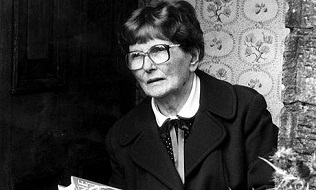
Catherine Cookson (27 juni 1906 – 11 juni 1998)
De Duitse schrijver Marcus Jensen werd geboren op 27 juni 1967 in Hamburg. Zie ook alle tags voor Marcus Jensen op dit blog.
Uit: Oberland
»Wir schreiben den dreizehnten Oktober dreiundsiebzig«,
sagen die Zwillinge hinter ihm im Chor, müssen gar nicht schreien, sind unrealistisch verständlich. Ich bin ein frühreifes Kind, mit fünf Jahren eingeschult. Trotzdem fällt mir hier nichts auf, aber das ist normal für mein Alter, denn noch nehme ich alles hin, und die vier Gestalten wissen genau, dass ich diese Szene vergessen werde. Ich lache. Der Bartträger versucht seine Brille freizuschütteln.
»Und, hast du dir die Nachwelt so vorgestellt?! Ein feines Wetter! Junge, deine Eltern haben Angst um dich! Leben ist Leiden, und du machst es ihnen auch noch schwer!«
Steig von der Kanzel, Dicker. Er streckt den Arm über meine Schulter aus:
»Dein Vater rennt gerade suchend durch das Schiff!«
Die Frau tritt neben ihn, die Zwillinge stellen sich dahinter, vier nasse Gesichter im Quadrat beobachten mich, und mir wird ungemütlich. Ich fange an, im Griff zu zappeln, meine Schuhe schlittern über das Metall, Aquaplaning. Die Frau schließt kurz die Augen:
»Lass ihn weitergehen, wir sind ja da!«
»Das Sauwetter ist sowieso gleich vorbei«,
die Zwillinge nicken synchron. Die Frau massiert beiden durch den Kapuzenstoff hindurch die Köpfe, sie schließen die Augen wie kleine Tiere. Sie lächelt:
»Kinder müssen spielen!«
Der Wikinger hört auf sie und klopft mir die Schultern ab, dass es patscht.
»Na gut, Jens, drei Schritte noch!«
Er lässt mich los. Am Horizont schimmert schon ein dünner hellgrauer Streifen, ein Lichtspalt. Die triefende Fahne wickelt sich um den kleinen Mast, die Schlitze unter der Reling knapp über dem Decksboden saugen Meerwasser ein und sprühen es als Schaum weiter.
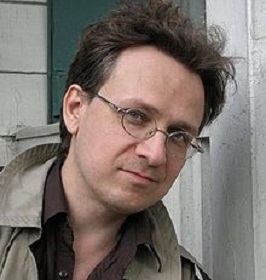
Marcus Jensen (Hamburg, 27 juni 1967)
De Braziliaanse schrijver João Guimarães Rosa werd geboren op 27 juni 1908 in Cordisburgo, Minas Gerais. Zie ook alle tags voorJoão Guimarães Rosa op dit blog.
Uit: Diadorim (Vertaald door Maryvonne Lapouge-Petorelli)
« La mémoire de la vie des gens se conserve dans des parcelles séparées, chacune d'elles avec son émotion et sa coloration, je crois même qu'elles ne se mélangent pas. Raconter à la suite, en enfilade, ce n'est vraiment que pour les choses de peu d'importance. De chaque vécu que j'ai réellement passé, de joie forte ou de peine, je vois aujourd'hui que j'étais chaque fois comme s'il s'agissait de personnes différentes. Se succédant incontrôlées. Tel je pense, tel je raconte. Vous avez bien de la bonté de m'écouter. Il y a des heures anciennes qui sont restées beaucoup plus proches de nous que d'autres, de date récente. Vous le savez bien.”
(…)
Ce flot sauvage, traitre – le fleuve est plein de fracas, de molles façons, de froidure, et de murmures de désolation. Je m’agrippais des doigts au rebord de la barque. Je ne pensais pas au Caboclo-d’agua, l’esprit des eaux qui chavirent les embarcations, je ne pensais pas au danger que sont, on le dit, les Onças-d’água, ces loutres qui sortent de l’eau, en bandes, et agressent les gens : elles encerclent la barque et font exprès de la chavirer. Je ne pensais à rien. J’avais la peur aveugle.”
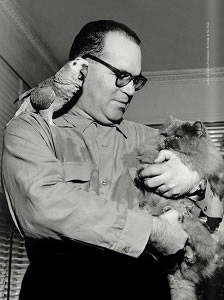
João Guimarães Rosa (27 juni 1908 – 19 november 1967)
De Franse filosoof en dichter Gaston Bachelard werd geboren op 27 juni 1884 in Bar-sur-Aube. Zie ook alle tags voor Gaston Bachelard op dit blog.
Uit:La psychanalyse du feu
“Aux dents de la crémaillère pendait le chaudron noir. La marmite sur trois pieds s'avançait dans la cendre chaude. Soufflant à grosses joues dans le tuyau d'acier, ma grand-mère rallumait les flammes endormies. Tout cuisait à la fois : les pommes de terre pour les cochons, les pommes de terre plus fines pour la famille. Pour moi, un œuf frais cuisait sous la cendre. Le feu ne se mesure pas au sablier : l'œuf était cuit quand une goutte d'eau, souvent une goutte de salive, s'évaporait sur la coquille. Je fus bien surpris quand je lus dernièrement que Denis Papin surveillait sa marmite en employant le procédé de ma grand-mère. Avant l'œuf, j'étais condamné à la panade. Un jour, enfant coléreux et pressé, je jetai à pleine louchée ma soupe aux dents de la crémaillère : " mange cramaille, mange cramaille ! ". Mais les jours de ma gentillesse, on apportait le gaufrier. Il écrasait de son rectangle le feu d'épines, rouge comme le dard des glaïeuls. Et déjà la gaufre était dans mon tablier, plus chaude aux doigts qu'aux lèvres. Alors oui, je mangeais du feu, je mangeais son or, son odeur et jusqu'à son pétillement tandis que la gaufre brûlante craquait sous mes dents. Et c'est toujours ainsi, par une sorte de plaisir de luxe, comme dessert, que le feu prouve son humanité. Il ne se borne pas à cuire, il croustille. Il dore la galette. Il matérialise la fête des hommes. Aussi haut qu'on puisse remonter, la valeur gastronomique prime la valeur alimentaire et c'est dans la joie et non pas dans la peine que l'homme a trouvé son esprit. La conquête du superflu donne une excitation spirituelle plus grande que la conquête du nécessaire. L'homme est une création du désir, non pas une création du besoin."
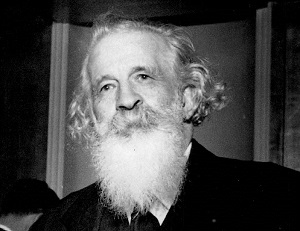
Gaston Bachelard (27 juni 1884 – 16 oktober 1962)
De Engelse dagboekschrijver en geestelijke James Woodforde werd geboren in Ansford op 27 juni 1740. Zie ook alle tags voor James Woodforde op dit blog.
Uit: The Diary of a Country Parson 1758 – 1802
“June 5. I breakfasted, dined, supped and slept again at Weston. Very much disturbed in the night by our dog which was kept within doors tonight, was obliged to get out of bed naked twice or thrice to make him quiet, had him into my room, and there he emptied himself all over the room. Was obliged then to order him to be turned out which Bill did. My face much swelled but rather easier than yesterday tho' now very tender and painful, kept in today mostly. Paid and gave Will my servant this evening 0.5.0. Paid Mr. Dunnell this evening part of a bill due to him from me, for 1 cows, 3 Piggs, 3 p'. Shoes, Flower, Tea, Sugar, News Papers, Pipes, Candles, Pan, Tobacco, Beer, Mustard, Salt, Washing, Halters, Comb and Brush, Crabs, Bread and Porterage of £14. 9. 3. the sum of a Bank Note - of - £10.0.0.”
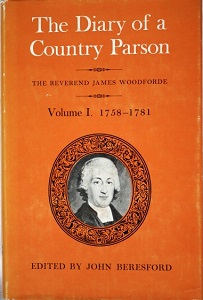
James Woodforde (27 juni 1740 – 1803)
Cover
De Amerikaanse schrijfster Helen Keller werd geboren in Tuscumbia, Alabama op 27 juni 1880. Zie ook alle tags voor Helen Keller op dit blog.
Uit: The Story of My Life
“Even in the days before my teacher came I used to feel along the square, stiff boxwood hedges, and, guided by the sense of smell, would find the first violets and lilies. There, too, after my fits of temper I went to find comfort and to hide my hot face in the cool leaves and grass. What joy it was to lose myself in that garden of flowers, to wander happily from spot to spot, until coming suddenly upon a beautiful vine, I recognized it by its leaves and blossoms, and knew it was the vine which covered the tumble-down summer-house at the farther end of the garden! Close by were trailing clematis, drooping jessamine, and some rare sweet flowers called butterfly lilies, because their fragile petals resembled the butterfly’s wings. But the roses — they were loveliest of all. Never have I found in the greenhouses of the North such heart-satisfying roses as the climbing roses of my Southern home. They used to hang in long festoons from our porch, filling the whole air with their fragrance, untainted by any earthly smell; and in the early morning, washed in the dew, they felt so soft and seemed so pure. I could not help wondering if they did not resemble the asphodels of God’s garden.
THE family on my father’s side are descended from Caspar Keller, a native of Switzerland, who settled in Maryland. One of my Swiss ancestors was the first teacher of the deaf in Zurich and wrote a book on the subject of their education — rather a singular coincidence. My grandfather, Caspar Keller’s son, “entered” large tracts of land in Alabama and finally settled there. I have been told that once a year he went from Tuscumbia to Philadelphia on horseback to purchase supplies for the plantation, and my aunt has in her possession many of the letters to his family, giving charming and vivid accounts of these trips.“
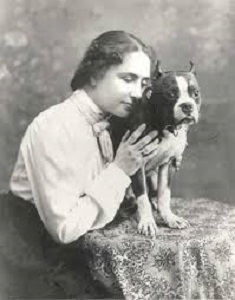
Helen Keller (27 juni 1880 – 1 juni 1968)
|



